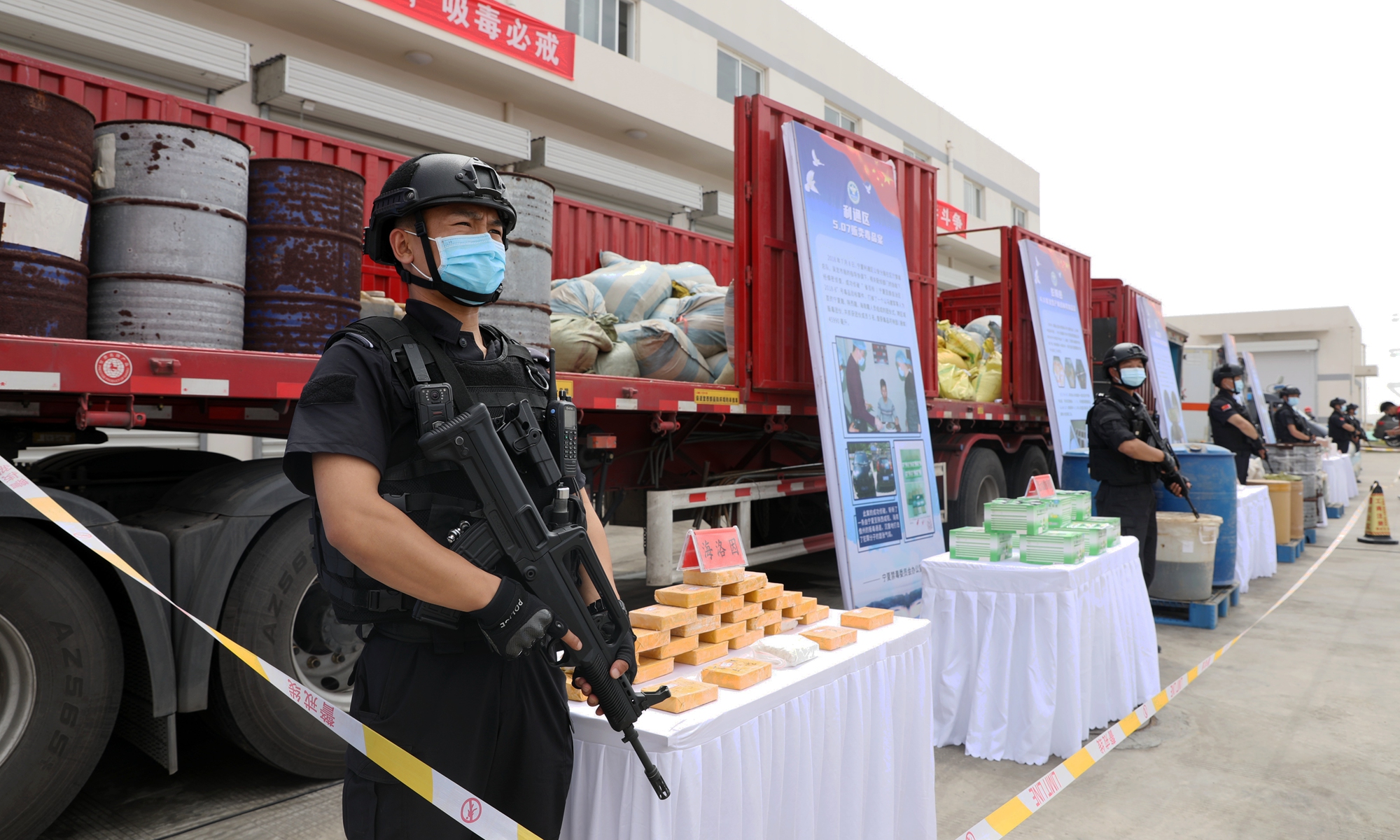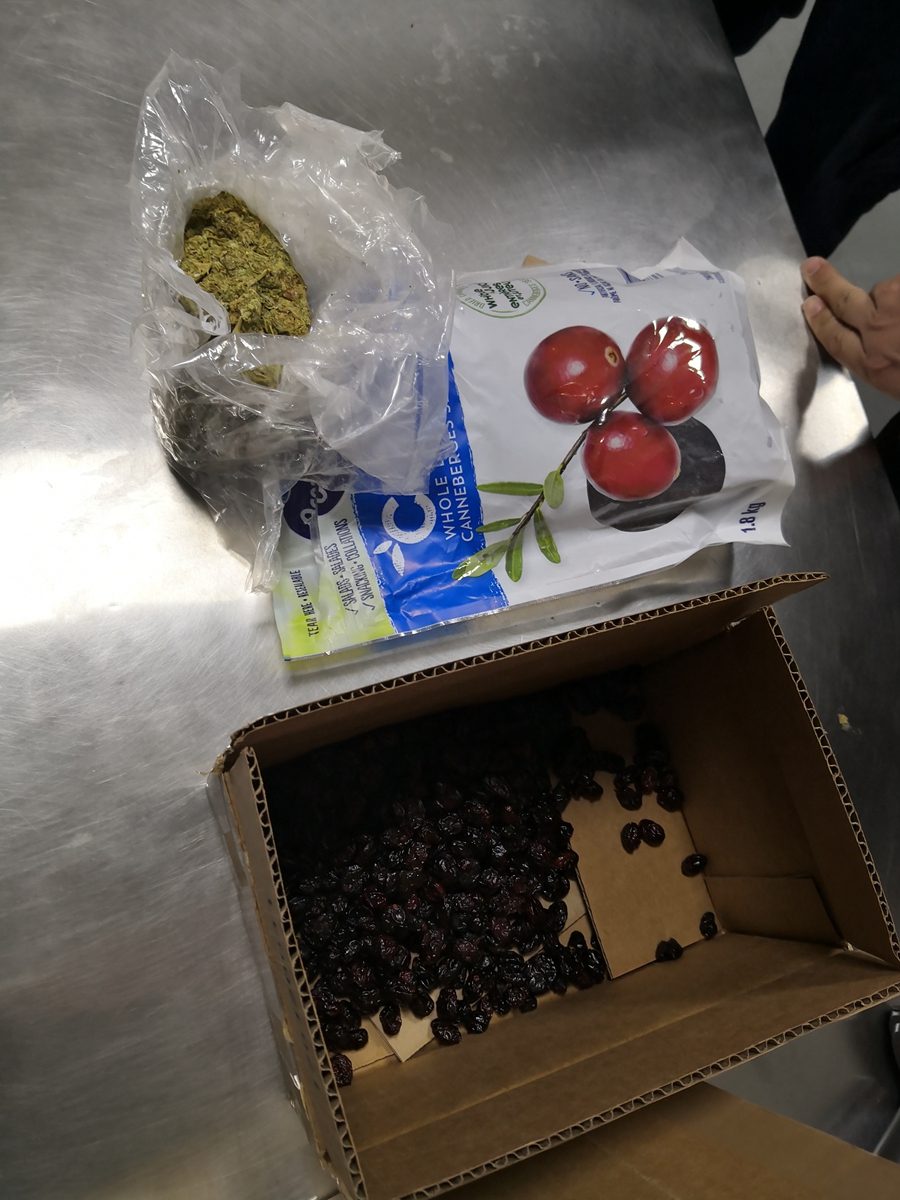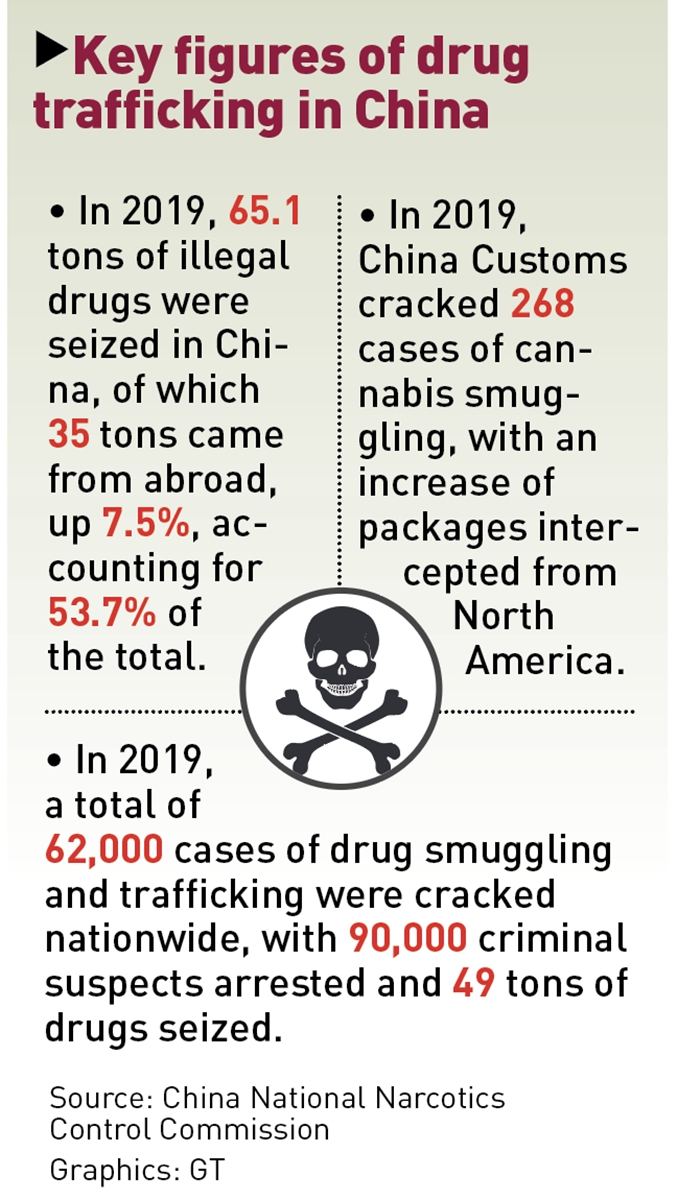SOURCE / INDUSTRIES
Drug smuggling on the rise
North America one of the top sources of illicit cannabis entering China

Police stand guard beside seized drugs in Wuling, Northwest China's Ningxia Hui Autonomous Region on June 22. Photo: cnsphoto
China Customs has been tightening their inspections of imported parcels amidst rising cases of drug trafficking in packages, with countries such as Canada and the US among the main sources.
On Wednesday, Customs officials in Wuhan, Central China's Hubei Province, seized a batch of dried cranberries imported from Canada which was also found to contain cannabis. This marks the most recent case in what appears to be a rising trend of drug trafficking from Canada into China, Chinese customs officials and experts told the Global Times.
Wuhan Customs told the Global Times on Wednesday that the suspected cannabis was found in three bags that also included dried cranberries. The officers' discovery was the first time in Wuhan this year that the drug has been found in a parcel from an overseas location.
An employee, surnamed Fan, with Wuhan Customs told the Global Times that Wuhan Post Office customs officers discovered an X-ray image of an incoming parcel from Canada labeled "dried cranberries" showed an abnormality.
After opening the box, the officers found that in addition to the dried cranberries, there were also three bags of vacuum-packed plant products, with a gross weight of 961 grams. These were found to be cannabis buds, the official said.
Rising cases from North America
An increasing number of cases of cannabis seized in China involve packages from North America, including Canada, which legalized cannabis in October 2018, as well as some states in the US where drug-taking is legal, Hua Zhendong, technical director of the national narcotics laboratory under the National Narcotics Control Commission, told the Global Times.

A bag of seized cannabis. Photo: Courtesy of Guangzhou Customs
Cannabis is legal in Canada and over half of US states, but is illegal in China. The cannabis buds are particularly potent compared with the other parts of the plant, Hua noted.
Wuhan is not the only place that is seeing such cases.
Cannabis smuggled from Canada has been detected by customs and public security authorities across the country on several occasions in recent years, including the seizure of 580 kilograms of Canadian cannabis by the Hong Kong SAR police, marking the largest such case in the recent history of the city, Hong Kong China News Agency reported on April 15.
The Global Times also learned from customs officials in Guangzhou, South China's Guangdong Province, on Wednesday that they have seized 200 grams of cannabis in a case involving concealed drugs smuggled through an express channel.
"The shipment came from Canada. It was the first time Guangzhou customs detected concealed drugs in dried fruits this year," a source with Guangzhou Customs told the Global Times, adding that the case has been handed over to the local public security department.
Other places, such as Southeast China's Xiamen and South China's Nanning, have also seized imported drugs from Canada this year.
Meanwhile, Beijing Post Office customs officers seized 4 tubes of cannabis-containing e-cigarette oil in a parcel labeled "shorts" from the US in July, the second case of cannabis tobacco oil being seized by Beijing Post Office customs this year, media reports.
This was followed by the Shanghai Post Office customs officers' seizure of 47 sticks of cannabis oil hidden in an international parcel from the US earlier this year.
The number of cases is increasing year by year, with the smuggling of cannabis from North America rising, according to a report by the Office of China National Narcotics Control Commission (NNCC) in June.

On August 7, the Foshan Intermediate People's Court in South China's Guangdong Province handed out the death sentence to Ye Jianhui, a Canadian citizen, who was found to have produced and transported illicit drugs between May 2015 and January 2016, according to media reports. Ye's case came one day after the Guangzhou Intermediate People's Court sentenced another Canadian citizen Xu Weihong to death for producing drugs.
Under China's criminal law, whoever smuggles, traffics, transports or manufactures narcotics, regardless of the quantity, shall be investigated for criminal responsibility and given criminal punishment.
With a tough stance on drug use from the authorities, the number of drug users continues to decrease in China and the prevalence of drug abuse continues to decline. By the end of 2019, there were 2.14 million drug users nationwide, accounting for 0.16 percent of the total population in China, a reduction of 10.6 percent, according to the NNCC.
However, with surging prices, the infiltration of drugs from abroad is escalating, meeting this demand and seizing market share.
Domestic production cases dropped by over 50 percent year-on-year in 2019, accounting for 4.1 percent of the total quantity of drugs seized. Nevertheless the seized cases from abroad increased up by 7.5 percent, accounting for 53.7 percent of the total amount seized.
In 2019, China Customs cracked 268 cases of cannabis trafficked inbound, the NNCC's report said.
The corresponding enforcement of these laws has intensified, with post and delivery enterprises urged to strictly implement real-name acceptance, inspection, and security checks at ports, said a previous statement sent by the NNCC to the Global Times.
The rising number of cases of drug trafficking from North America to China comes at a sensitive time as diplomatic ties between China and Canada sour over the latter's arrest and continued detention of a Huawei top executive at the behest of the US. Some foreign media outlets have also been smearing normal legal proceedings over Canadian citizens in drug-related cases. China has repeatedly stressed that it has been enforcing laws reasonably.
Commenting on the deteriorating relationship at a press conference on Wednesday, Zhao Lijian, spokesperson for China's Foreign Ministry, said that the situation between China and Canada did not reach the current stage because of China.
"The Canadian side is well aware of the crux of the problem," said Zhao, noting that Canada should take immediate and effective measures to correct its mistakes and create conditions for bilateral relations to return to the right track.

